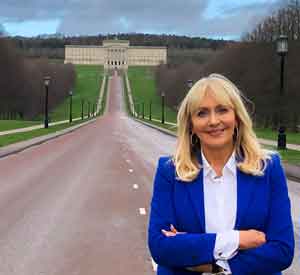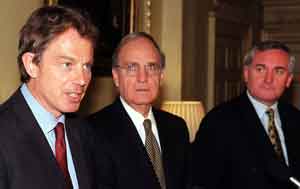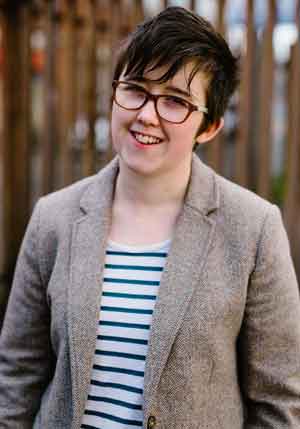THE AGREEMENT (2 parts)
RTÉ1, 3 and 4 April 2023
LYRA
Channel 4, 15 April 2023
By Sylvie Kleinman

The Agreement, a richly detailed documentary, minutely deconstructs in its first episode the intense context and protracted progress of the negotiations that led to the signing of the Good Friday Agreement on 10 April 1998. The second episode plunges us into the tension of the last hours, until David Trimble finally announced to the talks chairman, George Mitchell, that the Ulster Unionists were ‘ready to do the business’. The all-island referendum six weeks later involved the people, who ratified it. Mitchell, interviewed throughout, emphasises that voters and political leaders shared that landmark victory. Made in association with Queen’s University Belfast, the format of the programme is conventional, and Miriam O’Callaghan’s narration remains tightly focused on the subject. We weave in and out of footage reviving the bleak otherworldliness of the Troubles tucked away in our imaginations, as we are talked through stages of the 700 days of failure and that final day of success.
There are occasional upbeat sparks of nostalgia and snatches of the music hits of the day. Hours before the deal was clinched, after a mostly sleepless night, tensions were relieved in the canteen with a flash of unpolitically correct humour: Ulstermen musing about the paradoxical share-out of the remaining bacon buns between ‘Prods’ and ‘Taigs’ on Good Friday. Every historical twist and turn is documented, but the strength of The Agreement lies in its insightful interviews, stretching beyond the illustrious names. It is thus not all ‘history from above’, as we hear a bit from lesser-known architects, strategists or close eyewitnesses: government delegates, journalists waiting on tenterhooks and referendum campaigners. No historians or analysts outside the process are consulted, but the timeline stretching up to the present allows surviving players to reflect a bit more deeply a quarter-century later. Produced today, it could not do otherwise but reflect the emergence of gender balance in political debate, repositioning us back in the decade that had opened with Mary Robinson’s election. The Nobel Peace Prize-winners David Trimble and John Hume, whom we saw at the end in Oslo lighting the flame of peace, are only two of the major players no longer with us, and one also missed the sharp but inspirational wisdom of Seamus Mallon. Predictably, Tony Blair and Bill Clinton felt the hand of history upon their shoulders during that springtime of peace, and there were innumerable sound bites in rapid succession. Bertie Ahern was frank in addressing how tough the decision had been to release prisoners.

Very compelling were the determination and clear vision of the sagacious Mitchell—reminding us, too, of how instrumental character can be in history, especially when, as here, fostering and mediating conflict resolution. A human tragedy triggered a painful reminder at the beginning of what creates pivotal moments. On 3 March 1998 Philip Allen and Damien Trainor, lifelong friends across the sectarian divide, were shot dead in cold blood while having a soft drink by loyalist gunmen who thought that the Poyntzpass pub was Catholics-only. Damien was to have been the best man at Philip’s forthcoming wedding, and the mindless atrocity, broadcast internationally, galvanised the will of negotiators, engaged in very frail talks, to achieve peace. Images were also shared around the world of Mallon and Trimble visiting the Armagh village together.

Mitchell made it to Belfast for President Biden’s recent visit but had thought that he would not. He was interviewed for this documentary in remission from leukaemia, after two and a half years of chemotherapy, no longer in pain. To end a war, he bluntly put it (while admitting that it seemed simplistic), you have to involve the people waging the war, and that had not been done before. As we were approaching the end, and the outcome that we all knew, the release of prisoners was evoked. It seemed ‘unreal’ at the time and had led to some very divisive ‘jubilant parading’ of them. Throughout we had heard from Women’s Coalition negotiators Monica McWilliams and Bronagh Hinds and the Progressive Unionists’ Dawn Purvis, reminiscing about the talks. This may possibly mislead younger viewers, in particular, into believing that their contribution was applauded as much at the time as it is today. It took some time for the no-nonsense Mo Mowlam, who connected with people and had even gone into the Maze prison, to be recognised for her positive influence. At the end, however, just as back in 1998, it was really these women’s voices that forcefully projected the case for the families of victims, as there had been very little focus on them during the referendum campaign. Jeffrey Donaldson reiterated how the agreement underpinned the principle of consent and Gerry Adams spoke confidently about the end of the Union, while Mark Durcan referred to constitutional change. Beyond this documentary, a useful lesson in recent history, young people (none interviewed here) embody what we have learned about elsewhere in a more entertaining yet thought-provoking format as the Derry Girls generation.
The Agreement duly deconstructed the tactical planning behind the concert organised by the Yes campaign, as young voters remained undecided. Trimble had been assured that he wouldn’t be asked to sing, and then the mood was rebooted. Bono grabbed and raised Hume’s and Trimble’s hands on stage in triumph, projecting the message that their leap forward into the future was for the future of that youthful crowd. Optimism prevailed at the end because, as Hinds said, ‘we were weary and wanted change’ on the eve of the millennium.
But it seems inappropriate to conclude here, as, days after the Biden visit and its giddiness, the broadcast of Lyra starkly focused on grey areas of the peace. This intensely emotional portrayal of the investigative journalist Lyra McKee projected both her humanity and her grit. A ‘ceasefire baby’ and adept untwister of ideological rhetoric, emblematic of intergenerational trauma, she was shot, at the age of 29, by the New IRA while observing a riot in Derry. On the 21st anniversary of the Good Friday Agreement, her’s was the 160th ‘conflict-related’ killing since 1998.
Sylvie Kleinman is Visiting Research Fellow at the Department of History, Trinity College Dublin.
